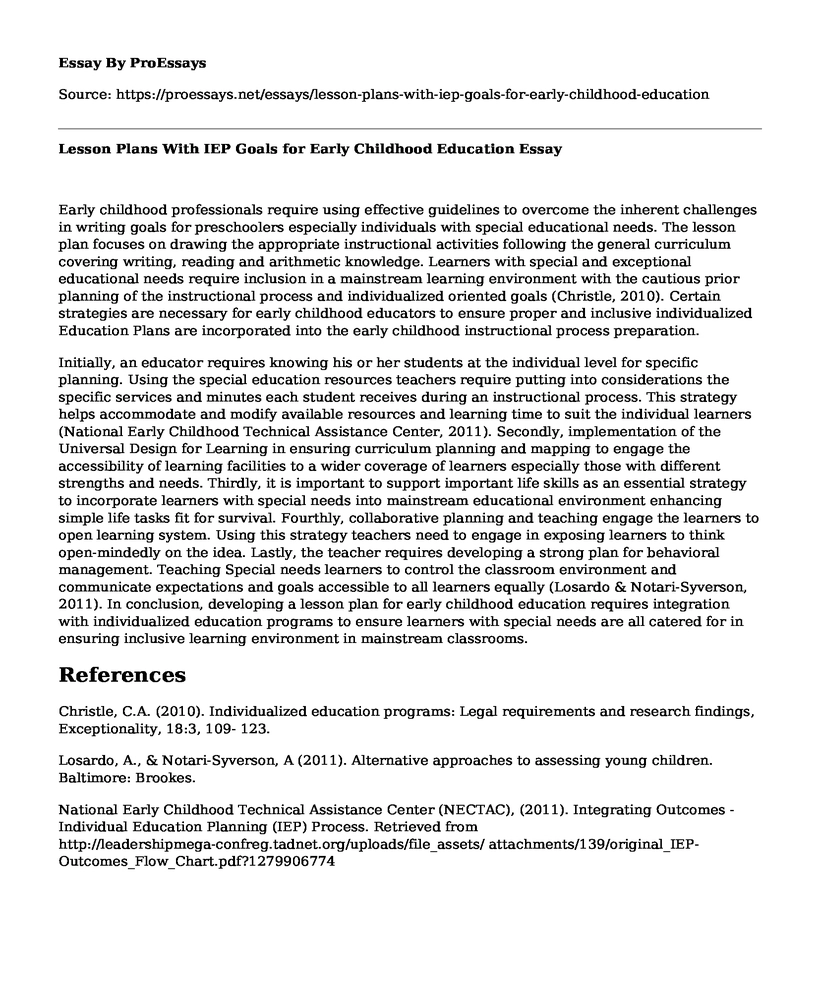Early childhood professionals require using effective guidelines to overcome the inherent challenges in writing goals for preschoolers especially individuals with special educational needs. The lesson plan focuses on drawing the appropriate instructional activities following the general curriculum covering writing, reading and arithmetic knowledge. Learners with special and exceptional educational needs require inclusion in a mainstream learning environment with the cautious prior planning of the instructional process and individualized oriented goals (Christle, 2010). Certain strategies are necessary for early childhood educators to ensure proper and inclusive individualized Education Plans are incorporated into the early childhood instructional process preparation.
Initially, an educator requires knowing his or her students at the individual level for specific planning. Using the special education resources teachers require putting into considerations the specific services and minutes each student receives during an instructional process. This strategy helps accommodate and modify available resources and learning time to suit the individual learners (National Early Childhood Technical Assistance Center, 2011). Secondly, implementation of the Universal Design for Learning in ensuring curriculum planning and mapping to engage the accessibility of learning facilities to a wider coverage of learners especially those with different strengths and needs. Thirdly, it is important to support important life skills as an essential strategy to incorporate learners with special needs into mainstream educational environment enhancing simple life tasks fit for survival. Fourthly, collaborative planning and teaching engage the learners to open learning system. Using this strategy teachers need to engage in exposing learners to think open-mindedly on the idea. Lastly, the teacher requires developing a strong plan for behavioral management. Teaching Special needs learners to control the classroom environment and communicate expectations and goals accessible to all learners equally (Losardo & Notari-Syverson, 2011). In conclusion, developing a lesson plan for early childhood education requires integration with individualized education programs to ensure learners with special needs are all catered for in ensuring inclusive learning environment in mainstream classrooms.
References
Christle, C.A. (2010). Individualized education programs: Legal requirements and research findings, Exceptionality, 18:3, 109- 123.
Losardo, A., & Notari-Syverson, A (2011). Alternative approaches to assessing young children. Baltimore: Brookes.
National Early Childhood Technical Assistance Center (NECTAC), (2011). Integrating Outcomes - Individual Education Planning (IEP) Process. Retrieved from http://leadershipmega-confreg.tadnet.org/uploads/file_assets/ attachments/139/original_IEP-Outcomes_Flow_Chart.pdf?1279906774
Cite this page
Lesson Plans With IEP Goals for Early Childhood Education. (2022, Jun 20). Retrieved from https://proessays.net/essays/lesson-plans-with-iep-goals-for-early-childhood-education
If you are the original author of this essay and no longer wish to have it published on the ProEssays website, please click below to request its removal:
- Should We Have Same-Sex Schools: Annotated Bibliography
- The Short-Term and Long-Term Effects of Divorce on Children Essay
- Evaluation of the Application of Educational Theory Paper Example
- 3 Types of Schooling: Homeschooling, Public & Private
- Essay on Young Dreamer's Mission to Become a Doctor: A Journey of Dedication, Empathy, and Curiosity
- Essay Example on Literacy Skills: A Key to Success and Quality of Life
- Teaching Early Children: My Personal Philosophy - Essay Sample







